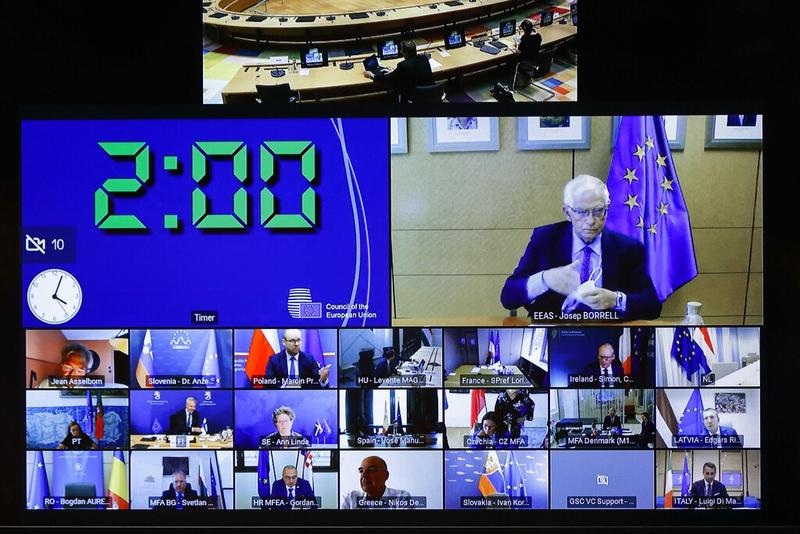 Josep Borrell, the EU's foreign policy chief, speaks with EU foreign ministers and representatives via video link in Brussels on Tuesday about the situation in Afghanistan. (JOHANNA GERON / POOL PHOTO VIA AP)
Josep Borrell, the EU's foreign policy chief, speaks with EU foreign ministers and representatives via video link in Brussels on Tuesday about the situation in Afghanistan. (JOHANNA GERON / POOL PHOTO VIA AP)
After two decades trying to destroy the Taliban, Western powers face the wrenching decision of whether to deal with the Islamist group that has taken over Afghanistan.
The European Union will only cooperate with the Afghan government following the Taliban's return to power if it respects fundamental rights, including those of women, and prevents the use of Afghanistan's territory by terrorists, Josep Borrell, the bloc's foreign policy chief, said on Tuesday.
Borrell put it bluntly on Tuesday: "The Taliban have won the war, so we will have to talk with them."
Earlier he outlined the EU's stance in a statement after an emergency meeting of European Union foreign ministers to discuss the Taliban's quick seizure of the capital Kabul.
He said that to address "the worsening humanitarian situation in Afghanistan", the EU would continue to provide assistance to the Afghan people.
Borrell called on all actors to allow safe and unhindered access for humanitarian assistance to Afghans in need, including the large number of internally displaced persons.
"The EU calls on the Taliban to respect their obligations under international humanitarian law in all circumstances," he said.
"The EU will also support Afghanistan's neighbors in coping with negative spillovers, which are to be expected from an increasing flow of refugees and migrants."
Borrell said the EU's priority is to evacuate EU staff and Afghan helpers from Kabul.
Starting a dialogue soon was necessary to prevent a potential migration disaster and a humanitarian crisis, Borrell said.
Flow of migrants
The EU's economy commissioner, Paolo Gentiloni, said in an interview with an Italian newspaper on Tuesday that Europe must make efforts to ensure the flow of migrants is managed safely.
"I think that Europe will inevitably have to equip itself for humanitarian corridors and organized reception, also to avoid uncontrolled flows of illegal immigrants. Or, at least, the countries that are willing to do so, should," Gentiloni told il Messaggero.
The firmest rejection of recognition came from Canadian Prime Minister Justin Trudeau, who called the Taliban a "recognized terrorist organization" that has "taken over and replaced a duly elected democratic government by force".
US military chiefs and diplomats have spoken to the Taliban to ensure evacuations, with the State Department saying it is open to keeping a presence at the Kabul airport beyond the Aug 31 end of the 20-year US war if it is safe enough.
But the administration of US President Joe Biden said any long-term relationship with a future Afghan government would depend on respect for women's rights and the Taliban's rejection of extremists such as al-Qaida.
"It will be up to the Taliban to show the rest of the world who they are and how they intend to proceed," Jake Sullivan, Biden's national security adviser, told reporters.
Britain on Tuesday announced plans to welcome up to 5,000 Afghans fleeing during the first year of a resettlement program that will prioritize women, girls and religious and other minorities.
Western powers have far less leverage with the Taliban in power rather than on the battlefield, Agence France-Presse said.
But the US still wields unrivaled influence with international lenders and can enforce rigorous sanctions, putting conditions on assistance needed to rebuild the war-battered country, it added.
Agencies, Xinhua and Jonathan Powell in London contributed to this story.


